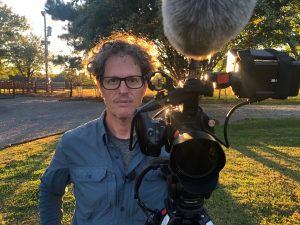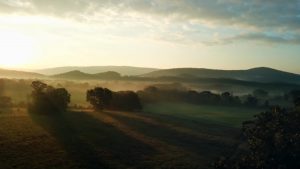

A decade ago, documentary filmmaker and musician Peter Byck brought together a diverse group of scientists who were studying agriculture from a whole-system perspective — something that was, and still is, unusual within ag science. Instead of specializing in one subject in isolation, they were looking at the interaction of many elements and seeing how they affected each other and the entire farm ecosystem.
Together they came up with a set of scientific studies on five pairs of ranches in the Southeastern US — in each pair one was doing Adaptive Multi-Paddock cattle grazing (also know as holistic planned grazing or rotational grazing), while the other was doing “conventional” grazing. The science team studied variables like soil, water, birds, insects, animals, etc. to see if there was a difference in results — and how those results affected the farmers’ bottom line.
Byck documented the entire process, and the resulting four-part documentary, Roots So Deep You Can See The Devil Down There, is streaming at rootssodeep.org. A fascinating and enormously entertaining journey into the world of family ranchers, the films ask some deep questions, including this: If the science tells you that what you’re doing isn’t working as well as an alterative, will you make changes? (You’ll have to watch the films to find out!)
TIMELINE
2’40 convening a group of renegade, holistic-minded scientists a decade ago
2’54 discovered the importance of soil when he made the film Carbon Nation
3’21 met Allen Williams and discovered the power of grazing, and made the film Carbon Cowboys
6’28 measuring many variables––all of which are interacting––and looking at systems rather than unrelated silos
7’41 not about telling the farmers what to do but rather look at what they were doing and comparing adaptive grazing to “conventional” grazing
8’50 put together a study of five pairs of farmers, one in each pair doing conventional grazing and the other adaptive multi-paddock grazing
10’43 benefits of “working with nature” rather than against it
12’26 the process of building trust and relationships with and among the farmers
16’02 what is AMP––Adaptive Mult-Paddock grazing
18’58 conventional grazers tended to come from grazing families, while AMP grazers came in new
19’36 Roots So Deep website (rootssodeep.org) has space for farmers, consumers, etc. to talk to each other
20’19 the data from the scientific study was for the farmers
21’08 honorable politeness in farming communities, which maintains harmony but also sometimes prevents people from talking deeply about what they do
22’20 busting stereotypes like “farmers won’t listen to the data”
24’00 scientific team as part of the documentary
25’59 made “Soil Carbon Curious” short documentary
26’45 bug paper published
28’11 Stephan van Vliet at Utah State University
29’05 microbial life and biodiversity are the engine of health for everyone involved––soil, plants, animals, people
31’00 all the different ways in which AMP ranchers did better
31’40 AMP grazers needed less hay
33’45 if you add up the big five crops they weigh less than the weight of soil lost to erosion from growing them––and the carbon footprint is higher than all the cow methane in North America
36’28 we’re having dustbowl events because of this
37’39 rewilding and making a profit at the same time
38’17 this project is a first step; now they’re moving to do studies in North and South Dakota
39’11 now there’s confusion about terms because “adaptive” is hard for some scientists to get their head around
40’04 hopes for the series
43’27 the potential for carbon sequestration on grasslands
44’16 the editing of the film



Subscribe:
Apple Podcasts
Spotify